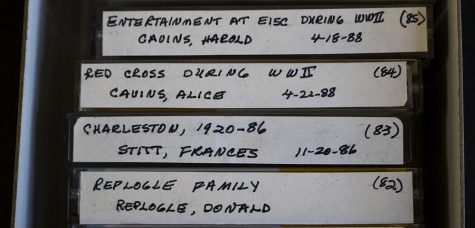Booth Library awarded grant to digitize oral interviews on local history
June 28, 2018

Some of the cassette tapes containing oral interviews on local history that will be digitized by the University Archives.
Booth Library has been awarded a grant of $6,849 from the Illinois State Library to digitize cassette tapes containing oral interviews on local history in the University Archives.
Bill Schultz, cataloging librarian and interim head of the University Archives and special collections, said the digitizing process will take about two years, and he plans to hire students to help out with the process.
The University Archives will digitize approximately 115 cassettes containing oral interviews related to local history (the East Central Illinois region). The interviews were recorded from the 1970s to the 1990s.
Some of the topics on the tapes include the 1917 Mattoon-Charleston tornado, the Lincoln Log Cabin, railroading in Coles County, Girl Scouts of Coles County during World War II, farming in Coles County during the 1920s and the Civilian Conservation Corps.
Shultz said some of the grant money will go toward a tape deck to digitize the cassettes and convert them to a digital format (MP3). The MP3 files will then be uploaded to the Illinois Digital Archives and the Digital Public Library of America.
The Illinois Digital Archives and Digital Public Library of America are archival websites that offer free access to historical documents such as photographs, oral interviews, government documents and manuscripts.
Schultz said the oral interviews will not be uploaded to The Keep (Eastern’s archival database), but there may be links to the oral interviews posted on there.
Schultz filed for the grant application with help from other faculty members.
He said he also received a lot of support from Beth Heldebrandt the public relations director at Booth Library during the application process.
Schultz said he chose this project for the grant because these cassette tapes are the only copies of these interviews, and they will not last forever.
“Anything like a tape, if it’s kept in a proper environment meaning, low humidity, a constant temperature of 65-70 degrees or even a little bit lower, but low humidity is critical, cassette tapes they can potentially, in some cases, last longer than CDs.” Shultz said. “A big part of it is how well they are cared for, so these tapes are fine up until this point, but they wont last forever.”
Shultz also said this was part of his motivation for the project because paper documents will last longer than cassette tapes, so this is more important to complete now compared to other projects.
Jordan Boyer can be reached 581-2312 0r [email protected].













































